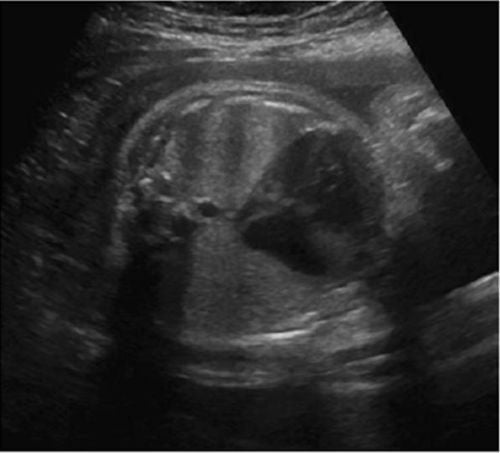This is an automatically translated article.
The article was consulted with Specialist Doctor I Le Hong Lien - Department of Obstetrics and Gynecology - Vinmec Central Park International General Hospital.Growth-restricted pregnancy (FGR) is a condition in which a baby does not achieve the expected growth potential. There are many factors that increase the risk of FGR. They may be related to the placenta, mother or child. Estimating fetal weight by ultrasound is the best way to determine FGR. If your baby has FGR, you will need to be closely monitored.
1. What is fetal growth restriction (FGR)?
Growth-restricted pregnancy (FGR) is a condition in which a fetus is smaller than expected for the number of weeks of pregnancy (gestational age). It is often described as an estimated weight less than the 10th percentile. This means that the baby weighs less than 9 out of 10 babies of the same gestational age. Infants with FGR may be called "small for gestational age".FGR can start at any time during pregnancy. With FGR, the baby does not grow well. FGR can affect a baby's overall size and the development of organs, tissues, and cells. This can cause many problems. But there are also many babies who are just small in size without any health problems.
2. What causes FGR?
There are many things that increase the risk of FGR. These include problems with the placenta or the umbilical cord. The placenta may not attach well or blood flow through the umbilical cord may be restricted. Factors in both mother and child can cause FGR.Maternal factors that can cause FGR include:
High blood pressure or other heart and blood vessel disease. Diabetes . Too few red blood cells (anemia) Chronic lung or kidney disease. Autoimmune conditions like lupus. Very low weight. Excess weight (obesity). Malnutrition or weight gain. Use alcohol or drugs. Smoke. Teratogenic exposure Infection : malaria , Toxoplasmosis , syphilis Factors in children that can cause FGR include:
Multiple pregnancy (carrying more than one pregnancy). Infection. Birth defects, such as heart defects. Problems with genes or chromosomes. Abnormalities of the placenta or umbilical cord: placental abruption, umbilical cord clinging to membranes or margins.

3. What are the symptoms of FGR?
Pregnant women do not have symptoms of FGR. But a baby with FGR may have some signs after birth, such as:Low birth weight. Low blood sugar. Lower body temperature. Respiratory failure High levels of red blood cells. Hyperbilirubinemia Difficulty fighting infections. Necrosis of the intestine Seizures.
4. How is FGR diagnosed?
One of the main reasons for regular prenatal visits is to make sure that your baby is developing well. During pregnancy, your baby's size is estimated in a variety of ways, including:The height of the uterus. To check the height of your uterus, your doctor will measure from the top of your pubic bone to the top of your uterus (fundus). Uterine height is measured in centimeters, which corresponds to the number of weeks of pregnancy after 20 weeks. For example, at 24 weeks pregnant, your uterine height should be close to 24 centimeters. If the uterine height is smaller than expected, it could mean FGR. If your doctor thinks you have FGR, you'll have other tests done. Includes:
Pregnancy ultrasound . Estimating fetal weight with ultrasound is the best way to find FGR. An ultrasound uses sound waves to create an image of the baby in the womb. Sound waves will not harm you or your baby. The doctor will measure the baby's head, femur, and abdomen CV to calculate the baby's weight. The diagnosis of FGR is based on the difference between actual and expected measurements at a given gestational age. Doppler ultrasound. You can also do this special type of ultrasound to diagnose FGR. Doppler ultrasound checks the blood flow to the placenta and through the umbilical cord to the baby, the oxygen supply to the baby's brain. Reduced blood flow could mean your child has FGR. You may have to have repeat ultrasound exams and other tests.
5. How is FGR handled?
Management depends on the severity of the FGR. This is based on ultrasound (estimated fetal weight) and Doppler ultrasound (blood flow to baby), as well as risk factors and number of weeks of gestation.Treatment may include:
Regular supervision. This means you will have more frequent prenatal visits, ultrasounds and Doppler ultrasounds. You may also have other tests. Monitor fetal movements. Your doctor may also ask you to monitor your baby's movements and he or she will guide you. Corticosteroids . Hospitalize. Early delivery or emergency cesarean section.

6. What are the possible complications of FGR?
FGR can cause many serious complications. Your baby may need to be delivered early and stay in the hospital. The baby may also have trouble breathing, infections, and other problems. The most dangerous is the possibility of stillbirth. As your child gets older, he or she will have a higher risk of heart and blood vessel problems.7. How to prevent FGR?
FGR can occur during any stage of pregnancy. However, there are certain factors such as smoking or alcohol use that increase the risk of FGR. Regular and early prenatal care combined with a healthy diet and steady weight gain will help prevent FGR and other problems.8. When should I call the doctor?
Make sure your doctor knows your health history. If you are counting fetal movements and find that the number of movements has decreased, let your doctor know. If you notice other changes or feel worried about your pregnancy, call your doctor.FGR is a dangerous condition if not detected and treated promptly. Therefore, prenatal health check-ups at reputable centers - hospitals are very important for mothers. Vinmec International General Hospital offers a Package Maternity Care Program for pregnant women right from the first months of pregnancy with a full range of antenatal check-ups, periodical 3D and 4D ultrasounds and other routine tests to ensure the mother is healthy and the fetus is developing comprehensively. Pregnant women will no longer be alone when entering labor because having a loved one to help them during childbirth always brings peace of mind and happiness.
Please dial HOTLINE for more information or register for an appointment HERE. Download MyVinmec app to make appointments faster and to manage your bookings easily.
Reference source: stanfordchildrens.org













